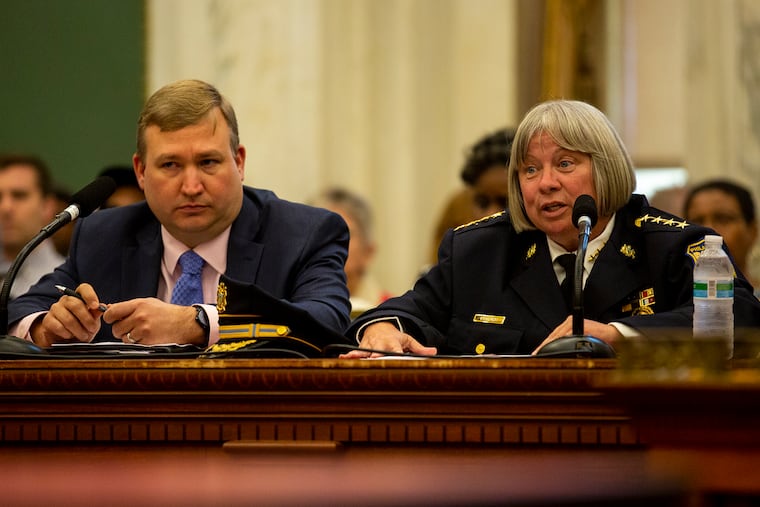Interim Philly police commissioner Christine Coulter apologizes for controversial T-shirt; Councilwoman Cindy Bass calls for resignation
“I am profoundly sorry that anything I would’ve done could’ve caused such hurt,” Christine M. Coulter said during a City Council hearing, 10 days after The Inquirer reported she wore a T-shirt in the 1990s bearing the words “L.A.P.D. We Treat You Like a King.”

Philadelphia’s acting police commissioner, Christine M. Coulter, apologized Tuesday for having worn a T-shirt in the 1990s that read, “L.A.P.D. We Treat You Like a King,” saying that although she did not recognize at the time that it could have been perceived as a reference to the Los Angeles police beating of Rodney King, she was “profoundly sorry” for having worn it.
Her remarks came 10 days after The Inquirer reported that she had been photographed in the shirt as a young police officer, and were made during a packed City Council hearing that had been scheduled to address another police issue, the publication of offensive Facebook posts by about 330 officers.
Shortly after Coulter’s apology, it became clear the hearing would become a forum for a broader array of issues. During her prepared remarks, Councilwoman Cindy Bass said she had written a letter to Mayor Jim Kenney calling on Coulter to “step down immediately” because of the T-shirt matter.
“It is inconceivable that she was unaware” of the shirt’s apparent reference to King’s beating, Bass said in a remark cut off by sustained applause from the audience.
The developments marked the latest fallout from a tumultuous summer for the Police Department. Since early June, the 6,500-member department has been racked by the scandal over the Facebook posts; former Commissioner Richard Ross’ sudden resignation after a claim of retaliation in a lawsuit; the shooting of six officers during a standoff in Tioga; and a continued drumbeat of gun violence and homicides across the city.
Kenney, in a statement issued later Tuesday, said that he did not think Coulter should resign and that a “bad decision” made 25 years ago did not void her decades of service to the city.
Still, the mayor added that the shirt “was abhorrent, wearing it was a mistake, and she took responsibility.”
The 1991 beating of King, filmed by a civilian, was covered by news media around the world and became a touchstone moment in the issue of police brutality.
Last week, Kenney’s spokesperson said that although the mayor understood that the shirt could be interpreted as a reference to Rodney King, he believed that Coulter’s “recollection of her perception was truthful.”
Regarding the Facebook scandal, Coulter told Council members that 15 officers had been suspended with intent to dismiss for making offensive posts — two more than Ross initially announced in July. Eleven of the 15 resigned prior to being fired, Coulter said.
She also said that Internal Affairs investigated 343 officers for their social-media activity, finding that 193 violated department policy, while 123 did not. An additional 27 investigations remain open.
Still, discussion at the hearing often veered away from specifics regarding discipline or policy changes in the wake of the Facebook scandal, and at times became emotional over general issues including police accountability and trust in the community.
Newspaper columnist and radio host Solomon Jones and Democratic sheriff nominee Rochelle Bilal, who is also president of the Guardian Civic League, a black officers’ union, delivered pointed and impassioned remarks on what they viewed as a culture of bias in the Police Department. They also demanded citizen inclusion in the search for a permanent commissioner.
After they spoke, audience members began chanting: “The people, united, will never be defeated!”
In the T-shirt episode, Coulter said last month that she had been photographed wearing the shirt at a gathering of officers at the Jersey Shore around 1994 when she was working in the 25th District. She said she had “never even thought of it as anything other than an L.A.P.D. shirt,” and reiterated Tuesday that when she was photographed in it, she did not recognize the potential connection between the slogan and King’s beating.
But Tuesday, Coulter called wearing the shirt a “careless decision,” and said “I should have known” that it could have been interpreted as a reference to King’s assault.
“I am profoundly sorry that anything I would’ve done could’ve caused such hurt,” Coulter said.
When she and Managing Director Brian Abernathy moved on to answering questions about the city’s response to the Facebook posts, Coulter elicited groans from the audience when she mentioned that the Police Department had received help with antibias training from the Los Angeles Police Department.
Coulter gave no indication that she would heed Bass’ call to resign, and responded to the councilwoman by saying that she had never intended to hurt anyone.
Coulter said she has dedicated her career to trying to serve the city and its residents, and added: “Anybody that I hurt because of something that I did is something that will trouble me forever.”
Staff writer Sean Collins Walsh contributed to this article.